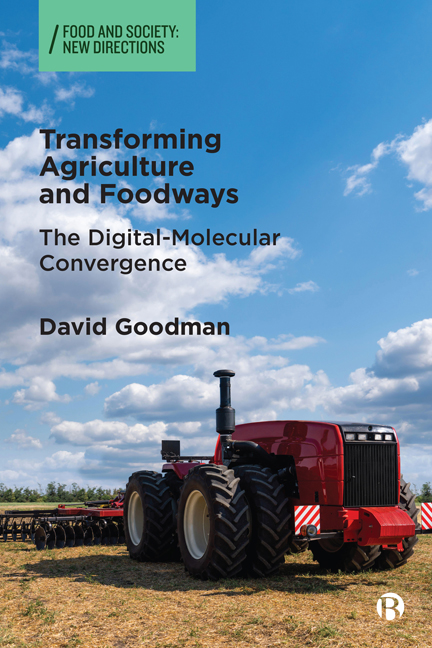Book contents
- Frontmatter
- Dedication
- Contents
- Series Preface
- List of Abbreviations
- Acknowledgements
- 1 Introduction: Technological Convergence and Change in Modern Agro-Food Systems
- 2 Precision Agriculture: Big Data Analytics, Farm Support Platforms, and Concentration in the AgTech Space
- 3 Precision Agriculture: Adoption, ‘Re-Scripting’, Farmer Identity, Path Dependence, and ‘Appropriationism 4.0’
- 4 Alternative Proteins: Bio-Mimicry, Structuring the New Protein Industry, ‘Promissory Narratives’, and ‘Substitutionism 4.0’
- 5 Agri-Biotechnology and the Failed Promises of the Seed-Chemical Complex, CRISPR and Gene Editing, and Regulatory Capture
- 6 Between Physical Space and Digital Space: COVID-19, Platform Capitalism, and Changing Patterns of Food Provisioning
- 7 Conclusion: Continuities in Change and Lost Opportunities
- Postscript
- Notes
- References
- Index
Postscript
Published online by Cambridge University Press: 18 January 2024
- Frontmatter
- Dedication
- Contents
- Series Preface
- List of Abbreviations
- Acknowledgements
- 1 Introduction: Technological Convergence and Change in Modern Agro-Food Systems
- 2 Precision Agriculture: Big Data Analytics, Farm Support Platforms, and Concentration in the AgTech Space
- 3 Precision Agriculture: Adoption, ‘Re-Scripting’, Farmer Identity, Path Dependence, and ‘Appropriationism 4.0’
- 4 Alternative Proteins: Bio-Mimicry, Structuring the New Protein Industry, ‘Promissory Narratives’, and ‘Substitutionism 4.0’
- 5 Agri-Biotechnology and the Failed Promises of the Seed-Chemical Complex, CRISPR and Gene Editing, and Regulatory Capture
- 6 Between Physical Space and Digital Space: COVID-19, Platform Capitalism, and Changing Patterns of Food Provisioning
- 7 Conclusion: Continuities in Change and Lost Opportunities
- Postscript
- Notes
- References
- Index
Summary
Transnational corporate power relations underlie the long-standing geo-political inequalities and rigidities in world trade and food policy (Friedmann, 2005; McMichael, 2005). These have been exposed most recently by the renewal of hostilities between Russia and Ukraine in February, 2022. Analysing the ensuing global food price inflation – ‘Another perfect storm?’ – IPES-Food (2022b) calls out the global food order for abject failures of governance to safeguard the poor in the vulnerable low-income countries of the Global South from global food price shocks, the third in the past 15 years. “Progress on reducing hunger has stagnated since 2014/ 2015, and went fully into reverse in 2020 as the pandemic drove hunger up by 54%, leaving up to 811 million under-nourished” (IPES-Food, 2022b: 4).
In the Global North, the world food price shock and upsurge in fuel and energy prices have combined to cause a ‘cost of living crisis’. The annual rate of inflation in the UK, for example, exceeded 10 per cent in 2022, leading some commentators to declare that the ‘golden era of cheap food is over’. The Russia– Ukraine war has exacerbated the downward spiral of food insecurity, food poverty, indebtedness, and social injustice experienced by lower income groups at the height of the COVID-19 pandemic in 2020– 2021, and which is likely to be compounded by global economic recession in 2023.
An overwhelming fear is that Western governments are responding to the historic opportunity presented by soaring energy and food prices not by accelerating a transition to sustainable production but by weakening their COP26 commitments to renewables and increasing their reliance on fossil fuels. Such a reversal would create a ‘perfect storm’ of growing intensity, threatening the habitable future of the planet.
- Type
- Chapter
- Information
- Transforming Agriculture and FoodwaysThe Digital-Molecular Convergence, pp. 96Publisher: Bristol University PressPrint publication year: 2023



